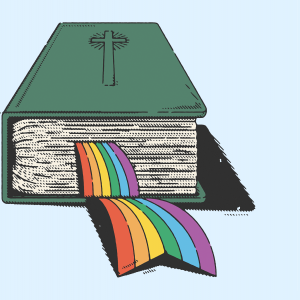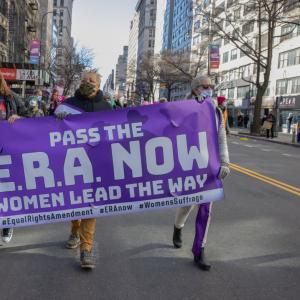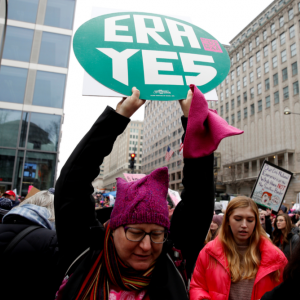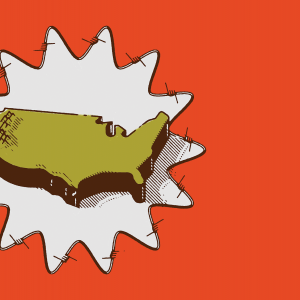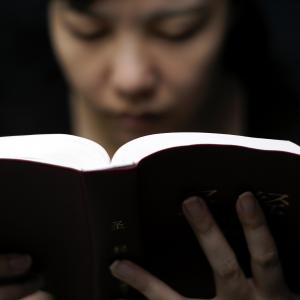
Allyson McKinney Timm, a human rights lawyer, is founder and executive director of Justice Revival.
Posts By This Author
The Amendment that Refuses to Die
2023 marks 100 years of the Equal Rights Amendment. It's still in legal limbo — and Christians can help bring it to life.
THREE YEARS AGO, I joined a struggle for what I view as the most transformational justice reform today: change to the U.S. Constitution. The change I advocate is at once unbelievably simple and profoundly radical: for Americans to agree that all citizens enjoy equal rights under law, whatever their gender or sexual orientation. It’s time to recognize the Equal Rights Amendment. Equality is central to most contemporary theories of justice. A majority of Americans puzzle why our nation has failed to live up to the promise of equality in our democracy. So why aren’t women protected equally?
“The ERA is dead,” opponents argue, laid to rest by an arbitrary time limit that was negotiated into the prelude of the bill Congress passed in 1972. A procedural objection seems a weak theory to lead with, in response to the unrequited aspirations of half the citizenry for basic human rights. Whatever the amendment’s merits, many claim, it cannot be revived. And yet miraculously, it has been. And women everywhere are testifying to this resurrection.
This is fitting, isn’t it? It was women, after all, who first testified to the resurrection. This Easter, we read how Mary Magdalene and the other Mary meet an angel at Jesus’ tomb, who commissions them to tell the disciples he is risen. The guards are too terrified to move, but the women rush to fulfill their divine calling (see Matthew 28).
No Justice Without Love
Balancing religious freedom with LGBTQ inclusion.
IN JUNE, THE SUPREME COURT held that a Catholic agency can exclude same-sex couples from its government-contracted foster care program, despite a city policy banning LGBTQ discrimination. Assertions of religious freedom carried the day in the narrow ruling of Fulton v. City of Philadelphia; at the same time, broader precedent remains, requiring religious groups to respect generally applicable anti-discrimination laws. The court deferred the deeper challenge of how to square vigorous claims of religious liberty with hopes of inclusion for LGBTQ people.
As people of faith, how do we make sense of these competing claims—for equality and nondiscrimination, bedrock human rights principles, and for religious freedom? For guidance, Christians can look to our own record on religious freedom, theological insight on human rights, and, above all, the ethics of Jesus and Paul.
Let’s begin by affirming that religious freedom deserves its place in the inner sanctum of basic rights. It is a hope that once emboldened persecuted communities to flee Europe and helped inspire the allied struggle against fascism. It remains indispensable for religious minorities the world over—like the Iranian Christian seminary student who fears grave persecution, or Sikh and Jewish communities suffering violence in this country.
Will the Equal Rights Amendment Threaten Religious Liberty?
Greater support for women and LGBTQ rights aligns with greater religious freedom protections. A study by Brian J. Grim at the Religious Freedom and Business Foundation found that “the average level of religious freedom is 36% higher in the countries with higher levels of support for LGBT rights than in countries with low levels of support for LGBT rights.” The expansion of human rights is good for religious freedom. This shouldn’t surprise us: A culture that values human rights for women and LGBTQ people will also value human rights for religious people.
If We Are Equal Before God, We Must Be Equal Before the State
It is well past time for the Equal Rights Amendment — now ratified by 38 states and supported by a supermajority of the populace — to be fully enshrined as the 28th Amendment.
A Bad Report Card on U.S. Human Rights
A global review will render judgment on Trump’s appalling record.
HOW HAS AMERICA honored its avowed commitment to human rights over the last four years? Fellow nations will consider that question later this year during the Universal Periodic Review, a quadrennial evaluation by the U.N. Human Rights Council to which all member states are subject.
The review, scheduled for this spring before postponement due to the COVID-19 pandemic, promises a thorough accounting of U.S. progress and failings on human rights at home. Given the Trump administration’s withdrawal from global processes designed to safeguard human rights and its dubious moves to redefine the scope of human rights protections, this review is vital.
Central to human rights and our modern conception of justice is the idea of equality. No one is above the law. All should be treated fairly, without bias or favor—a value reflected in the biblical juridical instruction to not “be partial to the poor or defer to the rich” (Leviticus 19:15).
This principle of equality animates the review, a uniquely democratic process in which every nation can speak truth to every other and none is exempt. “Universality, impartiality, objectivity, and non-selectivity” are guiding principles. With no regard for American “exceptionalism,” the UPR’s egalitarian structure aims to blunt the politicized use of human rights, in the U.S. and elsewhere, against adversaries alone.
Undermining Human Rights in the Name of Religious Freedom
The Pompeo commission is at odds with Jesus' radically egalitarian teachings.
THE 2018 STATE-SPONSORED execution of Jamal Khashoggi, a Saudi journalist and Washington Post columnist, was a brazen violation of his right to life by a repressive regime, yet the U.S. executive branch responded with near indifference. Then Secretary of State Rex Tillerson had already said that advancing U.S. interests should come before promoting U.S. values—such as defending human rights—and his successor Mike Pompeo has followed suit.
The Trump administration has disavowed the longstanding commitment to human rights by the U.S. in foreign policy. It has withdrawn from the U.N. Human Rights Council, ceded a voice on the U.N. body addressing racial oppression, and ignored the chorus of international condemnation of its family separation policy.
Looking Backward
The Pompeo commission is another Trump administration attempt to undermine human rights.
THE 2018 STATE-SPONSORED execution of Jamal Khashoggi, a Saudi journalist and Washington Post columnist, was a brazen violation of his right to life by a repressive regime, yet the U.S. executive branch responded with near indifference. Then Secretary of State Rex Tillerson had already said that advancing U.S. interests should come before promoting U.S. values—such as defending human rights—and his successor Mike Pompeo has followed suit.
The Trump administration has disavowed the longstanding commitment to human rights by the U.S. in foreign policy. It has withdrawn from the U.N. Human Rights Council, ceded a voice on the U.N. body addressing racial oppression, and ignored the chorus of international condemnation of its family separation policy.
When There Is No Justice in Scripture: The Rape of Tamar
When I first read about the rape of Tamar, I was astonished. This tragic story of a beautiful princess — sexually violated by her half-brother and then betrayed by her powerful father — left me aghast. What could I do with this troubling tale, tucked among pages of scripture where I sought spiritual guidance?
Throughout my life in the church, I had never heard the name “Tamar.” No reference to this daughter of King David. No remembrance of her profound suffering and grief.
It’s not an easy story to hear, especially within the biblical narrative of God’s love and providential care for God’s people. It’s like a well-guarded family secret no one dares mention, as if it might swell into a crushing typhoon, leaving devastation in its wake. Following tradition, I hoped not to encounter Tamar’s story again.
If shunning the ancient biblical story of Tamar is all too easy, avoiding news of unrelenting violence against women is becoming harder.

